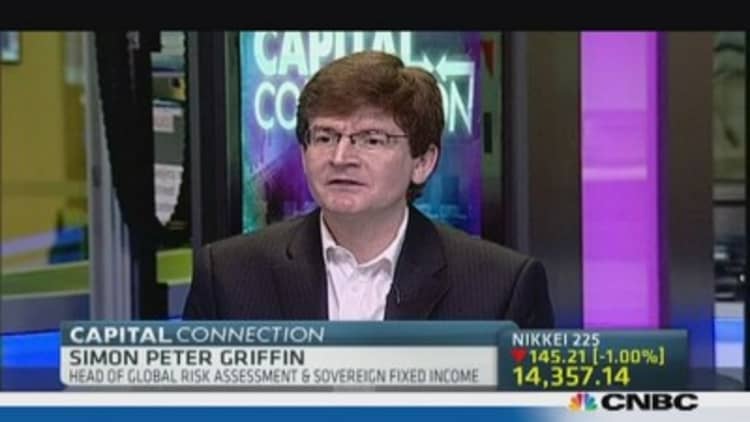The euro dropped sharply against the dollar on Thursday, with analysts citing concerns over the "tapering" of asset purchases in the U.S. and weak data released for the euro zone.
The Federal Open Market Committee, or FOMC, surprised virtually no one Wednesday when it kept its cheap-money policy, including its $85 billion a month in asset purchases, unchanged. However, markets interpreted the language in the decision as a sign that tapering of the bond buying may come sooner than expected. The current market consensus is that tapering won't begin at least until March 2014.
The statement omitted a reference from last month that fiscal tightening could slow growth in jobs and the broader economy. It also excluded mention of the political battling in Washington.
(Read more: More liquidity coming from ECB to avoid 'cliff': Nowotny)
The euro is buying around $1.3629, after hitting a high of around $1.3832 last week; it was trading around $1.3770 before the FOMC decision.
The drop was accentuated by inflation data on Thursday morning that showed consumer prices for the bloc sunk to a four year low at 0.7 percent, from 1.1 percent in September. Data also showed that unemployment in the euro zone was at 12.2 percent in September, stubbornly stuck at a record high.
"The single currency has been dealt a double whammy in the last 24 hours: firstly the FOMC statement has thwarted the dollar slide after it was less dovish than many in the market expected. Secondly, economic data from the euro zone has thrown into doubt the sustainability of the European economy." Kathleen Brooks, a research director at Forex.com said in a research note.
David Forrester, a strategist at Macquarie said that the initial fall for the currency on Wednesday evening was down to a FOMC that was not as dovish as the market was looking for.
It also indicated the economy would look much better if not for "fiscal contractions," he said, adding the Fed essentially "laid the blame for the tapering delay on gridlock in Congress."
In addition, the Fed is now expected to focus more on contemporaneous data going forward, rather than relying on forecasts, he said.
"The market is taking this as meaning December or January tapering is no longer off the table," as was previously assumed, he said. "We've seen a little bit of U.S. dollar strength on that."
(Read more: The Fed has enough ammo to taper: Trader)
Ng Kok Fai, head of foreign exchange advisory at Credit Agricole in Singapore, also noted the Fed's message wasn't as dovish as expected. He expects there is now around a 50 percent chance tapering will begin in December, with even higher chances for January.
To be sure, Forrester noted some Europe-specific factors are also weighing the euro, including the possibility the European Central Bank, or ECB, may need to introduce more liquidity, as well as weak German retail sales.
Germany's retail sales in September dropped 0.4 percent from a month earlier, compared with expectations for an increase.

(Read more: Why the euro area remains a good investment bet)
"The growth in the Eurozone is not taking off. It may be encouraging profit-taking after making recent highs," said Greg Gibbs, senior foreign-exchange strategist at RBS.
In addition, "it's a generally positive dollar environment. Some of that is just the fact that the U.S. dollar had weakened post payrolls last week, post the clearing of the fiscal impasse and we're seeing somewhat of a correction on that move and the euro is playing a role in the correction," Gibbs said.
—By CNBC.Com's Leslie Shaffer; Follow her on Twitter @LeslieShaffer1

